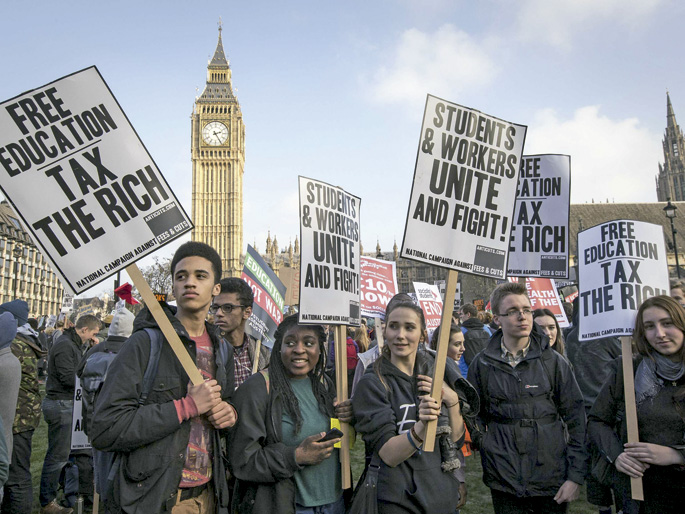A generation of lifelong indebted students in Britain
- David Cameron has raised a time bomb at the feet of British youth, making his universities the most expensive in the rich world and making students victims of the cutbacks. Debts of 60,000 euros will accumulate in college time, which many will not be able to pay until they are at least 50 years old.

“Rising student debt deepens the injustice of an entire generation,” Hertford College director Will Hutton wrote in The Guardian. “With this treatment of young people, Britain is creating a society that is the greatest stratification, the least social mobility and the most cruel unjust.”
On April 25, 2012, American students celebrated the One Trillion Day to report that they were more indebted than anywhere else in the world. 67% of students completed their four-year career with outstanding debts. Three years later, the British take the first place in the sad ranking: more than 80% of new graduates live in debt.
Enough of Paris! Emmanuel Sanseau counts in a newspaper: “Pourquoi les étudiants britanniques croulent sous les dettes”, that is, why British students vent in debts.
To begin with, he visited the University of Manchester. He's been surprised to find a campus so beautiful, orderly, tree-filled, like an oasis in the middle of the polluted city. Until he meets college students of meat.
Emma is 21 years old and... GBP 27,000 (EUR 35,000) On the day when you start earning £21,000 (EUR 29,000) a year, the credit granted to you by the State will begin to be paid.
Emma: “By adding the father’s and mother’s salaries they earn 30,000 pounds a year, they sacrifice themselves so that I can learn. I go ahead in one way or another, paying more attention to a small work of hours and to the control of current expenditure than to studies. I don’t complain, a friend of mine makes replacements, twelve hours a night, and has had to interrupt all social life.” Instead, his university director earned 251,000 pounds a year, 29,000 pounds a month.
Since the outbreak of the war of cutbacks by the Cameron Government, universities have done three times these fees, from 3,000 bookstores to 9,000. With the other hand, Cameron has removed the scholarship system or pouch for students. The first few million British students – a maximum annual of GBP 3,387 (EUR 4,600) – but now nothing. As a counterpart, they are offered a credit system.
Indebted diplomats who have completed three years of career have an average hole of 44,000 pounds (63,000 euros). In pesetas just over ten kilos. The Institute for Fiscal Studies has calculated that most studies will pay from the age of 50.
When a graduate arrives and earns £21,000 a year, then the state credit company Student Loans Company discredits him 9% until the deferred loan is cancelled. This deduction ends 30 years after the start, regardless of whether the debt has been paid in full or not.
With GBP 10 billion a year advanced to students, the state has made a lot of extraordinary loans: the government estimates that the limit of GBP 100 billion (EUR 13 billion) will be exceeded between 2018. For example, the total retirement budget in 2014 was £103 billion.
Studies have shown that the number of diplomats who will not be able to pay their debts could reach 45%, and in the United Kingdom they start hearing the alarm calls because there is a time bomb that could explode. The Ministry of Finance itself estimates that if the defaults reach 48.6%, the cost to the State will be higher than that which has dismantled the current system. On the pretext of slimming down the State, the system will increase public debt.
Parental Pensions for Child Learning
Students who cannot pay for it are at the mercy of the usurers who lend themselves to the Internet. Vultures such as Piggybank offer services at a shameful interest rate on the Internet: They'll give you 300 pounds a week -- in six months, if 582 come back.
Every year, 30,000 students touch loans of this kind on the Payday Loan. The lack of payment has caused an accident. In 2013, Kane Sparham- Price was found guilty of suicide at his home in Ashton-under-Lyn, near Manchester, New York. The inability to return the debt did not allow him to improve the psychological circumstances he already had. Hours before he committed suicide, the company Wonga, the leader of the loane Payday, emptied all the funds he had in the bank, always within the law.
Emmanuel Sanseau has reported that the English media have often shown students living in poverty, surviving without a penny in shattered apartments, without heating. It seems that people have become accustomed to that new normalcy. In order to survive, three-quarters of British students have to work.
In precarious work, the prefect, with contracts of zero hours, without guarantees of a decent end of the month. Others have to resort to charitable associations, food banks, etc. Some universities have already begun to study the organization of their social canteens. “This is the extraordinary social balance of the Cameron government,” says Sanseau. He proudly proclaims that the economy has begun to revive in the United Kingdom, unhesitatingly legitimizing the misery that the diploma will allow them to earn more, but then statistics show that 60% of graduates are in jobs below their qualifications.”
University director Will Hutton has written that Cameron's policies will leave serious consequences to families. On the one hand, for parents to be able to give their children their pension by relieving inheritance taxes, and on the other, by destroying the scholarship system, the rich will be able to alleviate their children’s debts, but those who are tightened will sink by the need to use everything they have to pay back arrears.
Universities have entered into competition with each other, using marketing to attract new students, specialising in careers announced that they will get the best salaries on the market, transforming their character – says Hutton – from sound academic education to high-end employment studies.
They all happen in Britain. But all around us? Gloria Mbilla has reported that with the policy established by José Ignacio Wert in the government of pp 70,000 young people have been located in the Community of Madrid who were forced to give up their university studies. Debts and frustrations will be no less when the new government in Madrid begins to implement the cuts of EUR 12 billion promised by the European Union.











.jpg)













